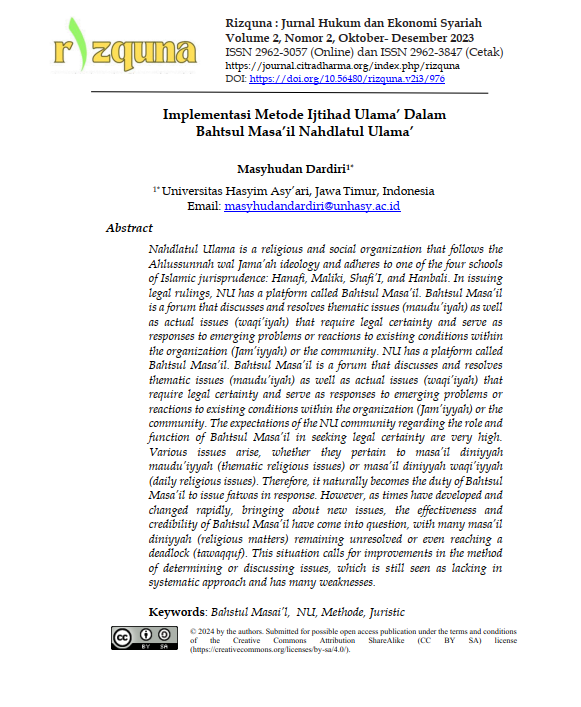Implementasi Metode Ijtihad Ulama’ Dalam Bahtsul Masa’il Nahdlatul Ulama’
DOI:
https://doi.org/10.56480/rizquna.v2i2.1057
 Abstrak View:
Abstrak View:
114
 PDF downloads:
PDF downloads:
171
Kata Kunci:
Bahstaul Masa'il, Nahdlatul Ulama', Method, JuristicAbstrak
Nahdlatul Ulama is a religious and social organization that follows the Ahlussunnah wal Jama’ah ideology and adheres to one of the four schools of Islamic jurisprudence: Hanafi, Maliki, Shafi’I, and Hanbali. In issuing legal rulings, NU has a platform called Bahtsul Masa’il. Bahtsul Masa’il is a forum that discusses and resolves thematic issues (maudu’iyah) as well as actual issues (waqi’iyah) that require legal certainty and serve as responses to emerging problems or reactions to existing conditions within the organization (Jam’iyyah) or the community. NU has a platform called Bahtsul Masa’il. Bahtsul Masa’il is a forum that discusses and resolves thematic issues (maudu’iyah) as well as actual issues (waqi’iyah) that require legal certainty and serve as responses to emerging problems or reactions to existing conditions within the organization (Jam’iyyah) or the community. The expectations of the NU community regarding the role and function of Bahtsul Masa’il in seeking legal certainty are very high. Various issues arise, whether they pertain to masa’il diniyyah maudu’iyyah (thematic religious issues) or masa’il diniyyah waqi’iyyah (daily religious issues). Therefore, it naturally becomes the duty of Bahtsul Masa’il to issue fatwas in response. However, as times have developed and changed rapidly, bringing about new issues, the effectiveness and credibility of Bahtsul Masa’il have come into question, with many masa’il diniyyah (religious matters) remaining unresolved or even reaching a deadlock (tawaqquf). This situation calls for improvements in the method of determining or discussing issues, which is still seen as lacking in systematic approach and has many weaknesses.
Referensi
Dahlan, Abdul Aziz. 1999. Ensiklopedia Hukum Islam, Jilid III. Jakarta: PT. Ichtiar Baru van Hoeve.
Dhofier, Zamakhsyari. 1984. Tradisi Pesantren, Studi Tentang Pandangan Hidup Kia. Jakarta: LP3ES.
Hadratussyekh KHM. Hasyim Asj’ari. 1969. Ihya’ ‘Amal Al-Fudala’:Muqaddimah Anggaran Dasar NU. Kendal.
Haedari, HM. Ami. n.d. Masa Depan Pesantren Dalam Tantangan Modernitas Dan Tantangan Kompleksitas Global. Jakarta: IRD Press.
Imam, and Nasikh. n.d. Liputan : Dari Halaqah Denanyar, Jurnal Santri No. 3,Tahun I (1990).
Kholidah. 2000. “Metode Ijtihad Dewan Fatwa Al-Jam’iyatul Washilah Periode 1988 – 1998.” Tesis MA, IAIN Sumatera Utara Medan.
Mahfudh, KH. Sahal. 2011. “Bahtsul Masa’il Dan Istinbath Hukum NU, Dari Pengantar Buku Solusi Problematika Aktual Hukum Islam: Keputusan Muktamar, Munas Dan Konbes Nahdlatul Ulama (1926-2010).” LTNU PBNU – Khalista.
Masyhuri, KH. Aziz. 1997. “Masalah Keagamaan NU.” Dinamika Press.
Mudzhar, Muhammad Atho. 1993. Fatwa-Fatwa Majelis Ulama Indonesia : Sebuah Studi Tentang Pemikiran Hukum Islam Di Indonesia, 1975 – 1988. Jakarta: INIS.
Pasaribu, I. L., and Simanjutak B. 1983. Proses Belajar Mengajar. Bandung: Tarsito.
Rahmat (ED), M. Imdadun. 2002. “Kritik Nalar Fiqih NU Transformasi Paradigma Bahtsul Masa’il.” Lakpesdam.
Rosyada, Dede. 1999. Metode Kajian Hukum Dewan Hisbah Persis. Jakarta: Logos Wacana Ilmu.
Said, Ridwan Qoyyum. 2004. Rahasia Sukses Fuqoha’. Kediri: Mitra Gayatri.
Subhan, Mohammad, and H. Soeleiman Fadeli. 2007. Antologi NU : Sejarah-IstilahAmaliah-Uswah. Surabaya: Khalista.
Zahro, Dr. Ahmad. 2004. Tradisi Intelektual NU : Lajnah Bahtsul Masa’il 1926-1999. Yogyakarta: LKis.

Unduhan
Diterbitkan
Terbitan
Bagian
Lisensi
Hak Cipta (c) 2024 Masyhudan Dardiri

Artikel ini berlisensiCreative Commons Attribution-ShareAlike 4.0 International License.








